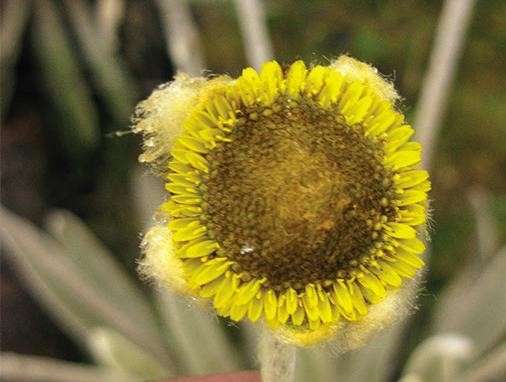Credit: Royal Botanic Gardens, Kew
A new plant species from Northeastern Colombia has been named Espeletia praesidentis, in honour of efforts made by Colombian President Juan Manuel Santos to build peace in his country after over five decades of conflict. The plant, from the genus Espeletia in the sunflower family, was discovered by a Colombian botanist from the Royal Botanic Gardens, Kew and named in a study published in the open access journal PhytoKeys last week.
The newly described species was collected during an expedition in 2009, while many parts of Colombia were in conflict and dangerous or inaccessible, and during which the researcher, Dr Mauricio Diazgranados, met with left-wing armed members of FARC. It was found 28 km south of the city of Chitagá in the Páramo de Presidente ecosystem. Like many parts of Colombia, the páramo - ecosystems found above the continuous forest line yet below the permanent snowline - are considered to be evolutionary hot spots among the fastest evolving regions on earth and have not yet been studied in any detail.
Commenting on the significance of the discovery, Colombian-born Diazgranados, a Research Leader on Diversity and Livelihoods in the Natural Capital and Plant Health department of RBG Kew, said:
"Kew is working ever more closely with the Colombian government in efforts to identify and protect the incredible biodiversity of this country which has been closed to researchers during 52 years of conflict. Naming this new species is a way to acknowledge the importance of the peace agreement brokered by President Juan Manuel Santos Calderón, which will open up more botanical exploration. Espeletia praesidentis exemplifies the lack of collections from throughout the 'páramos', and shows some of the challenges taxonomists have to face when studying this group."
RBG Kew and Colombia recently signed an agreement to start a new phase of cooperation to help identify, protect and promote the country's plant and fungal diversity through collaboration in the Colombia Bio programme. This includes several large joint field expeditions to discover, identify and name plants and fungi, as well as exploring their potential for sustainable use to benefit local livelihoods and the economy. Vegetation mapping and documentation of species diversity and traits will, combined with climate models, support vital assessment of their resilience to climate change. The research will help the Colombian government to achieve in situ conservation objectives by identifying priority areas and threatened species for protection, as well as supporting ex situ conservation in seed banks: an area which Kew has significant experience of via its Millennium Seed Bank Partnership.
The new species discovered is endemic to Colombia and is only known from the Páramo de Presidente, at elevations of 3400-3600 m. Although a large population of several hundreds of individuals growing in the grasslands of the páramo were observed, this particular area is not under any protection, and there are signs of grazing activity. In addition, the proximity of extensive potato plantations suggests that the species is probably critically endangered.
More information: Mauricio Diazgranados et al. Espeletia praesidentis, a new species of Espeletiinae (Millerieae, Asteraceae) from northeastern Colombia, PhytoKeys (2017). DOI: 10.3897/phytokeys.76.11220
Journal information: PhytoKeys
Provided by Royal Botanic Gardens, Kew























